Wellingborough votes - from Shakespeare to Dallas
 Getty Images
Getty ImagesThere are very few constituencies that have been represented by all three of the traditional "major" parties and seen winning margins vary from just 47 to more than 18,000.
Wellingborough does not just tick those boxes, it can also claim to be one of only two places to have been represented by a possible descendant of William Shakespeare.
Geoffrey Shakespeare was elected as the National Liberal MP in 1922, four years after Labour's Walter Smith had become the first Wellingborough representative in the House of Commons.
Shakespeare had been private secretary to the then prime minister, David Lloyd George, and had not been expecting to win, let alone with a large majority.
Unfortunately for him, elections had become an annual occurrence in the 1920s and he lost the seat in 1923 to a teacher from the Rhondda, William Cove.
Both Lloyd George and Ramsay MacDonald visited the constituency during the 1923 campaign - even then, it was a key marginal.
Mr Cove held onto the seat in 1924 but then got homesick and became MP for the safe Labour seat of Aberavon for the next 30 years.
 Getty Images
Getty Images'Courtesy of my opponents'
The next few elections were dominated by a fierce, though gentlemanly, battle between a Glaswegian miner called George Dallas, representing Labour, and pioneering airman Archibald James for the Conservatives.
Mr James, who had been a wing commander, lost out in 1929, although his Labour rival acknowledged the "courtesy of my opponents" in the contest.
Two years later, in the National Government landslide of 1931, honours went the other way with the military man beating the miner by nearly 8,000 votes.
In another rematch in 1935, Mr Dallas lost by just 372 votes, amid allegations that he had been attacked by youthful supporters of the party.
In the first election after the war, it was Mr James who got to taste defeat as a railway clerk called George Lindgren swept to victory with a lead of nearly 6,000 votes.
He increased his majority in 1950, but the trend did not continue, and the winning margin was just 926 in 1955.
Then came Harold Macmillan and his speech that told citizens that they had "never had it so good", which may have helped Michael Hamilton to victory for the Conservatives in 1959 by 606 votes.
Five years later, another railway clerk came steaming down the tracks to snatch the seat back for Labour, with Harry Howarth winning by just 47 votes.
 PA
PAMr Howarth kept his seat in the big Labour victory of 1966 but died three years later at the age of 53. His death triggered a by-election, which saw the debut of a man who was to represent the town for almost 30 years - Sir Peter Fry.
Sir Peter had built up a majority of more than 14,000 by the time Margaret Thatcher contested her final election in 1987. Yet defeat was to come in the Labour landslide of 1997 with Paul Stinchcombe, one of Tony Blair's speech writers, taking the seat with a margin of 187 votes.
Peter Bone tried to unseat Mr Stinchcombe in 2001 and succeeded at his second attempt in 2005, finishing 687 votes ahead.
Looking at the changes of party and the fluctuations of majority over the years, the only thing that can be said with any certainty about a Wellingborough election is that nothing is certain.

Follow East of England news on Facebook, Instagram and X. Got a story? Email [email protected] or WhatsApp 0800 169 1830
